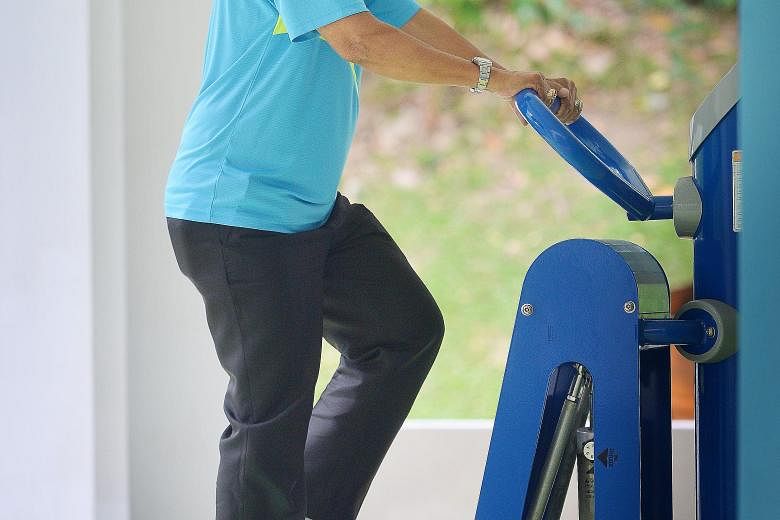Retiree Hanafi Ismail, 67, puffed on cigarettes for almost half a century.
However, a heart attack last year spurred the former security guard to finally make a serious attempt to break the habit.
But quitting was "really difficult", he said, even though he had two stent implants to widen his blocked arteries after the heart attack.
"Every time I finished lunch or dinner, I just felt like having a cigarette between my fingers," he said.
He decided it was unrealistic to go cold turkey. He said: "I decided to gradually reduce my intake - from two packs, to one pack, to five sticks, then three."
-
Tips on quitting the habit
-
If you are trying to stub out the urge to light up, here are some methods and useful tips to help.
WAYS TO QUIT
•Go cold turkey. Decide to stop smoking on a particular date, and stick to that decision.
•Gradual reduction. Cut down on the number of cigarettes you smoke every day. Aim to reach zero by a specific date.
•Delaying. Postpone your usual cigarette break by an hour - or more, if you can. Aim to go smoke-free for an entire day. Do this until you get used to not smoking at all.
•Seek professional help. Counsellors and addiction experts can help to evaluate the severity of your addiction and provide advice to cope with withdrawal symptoms.
•Nicotine replacement therapy. Nicotine gum, skin patches, lozenges and nasal sprays are nicotine substitutes that you can use to counter the urge to smoke and relieve withdrawal symptoms.
•Nicotine-free medication. This helps to reduce the intensity of withdrawal symptoms.
TIPS AND TRICKS
•Throw away all your lighters, ashtrays and cigarette packs.
•Tell your family, friends, colleagues and neighbours that you are going to quit.
•Make a list of friends who will support you, including smoking buddies who are
also thinking of quitting. Call or message them when you have an urge to smoke.
•Write down your reasons for quitting on pieces of paper, or make "no smoking" signs. Put these up in visible areas. Examples include your office desk, inside your wardrobe or toilet.
•Have a plan on what you will do if you experience the urge to smoke or withdrawal symptoms.
WITHDRAWAL SYMPTOMS AND HOW TO FIGHT THEM
•Constant cravings: Distract yourself, delay lighting up, do deep breathing exercises or slowly drink a glass of water or milk.
•Headaches: Get adequate sleep, go somewhere quiet and comfortable, read something or watch TV with the lights on.
•Irritability: Do relaxation exercises, listen to soothing music, catch a movie or do light exercises. Take a whiff of peppermint oil or drink peppermint tea to calm your nerves.
•Fatigue: Scale back on activities, do light exercises and get adequate sleep. Take small, regular meals to boost your energy levels.
•Coughs: Drink warm water or take sugar-free cough drops.
•Tingling feeling in hands and feet: Go for a massage, take a walk or read a book, do stretching exercises or yoga.
SOURCE: HEALTH PROMOTION BOARD
For the final stretch, he received a boost from the I Quit programme run by the Health Promotion Board (HPB). He signed up for the programme's Ramadan Challenge last year, and received regular calls and messages from HPB staff.
"They would check on me and ask me if I had been smoking," said Mr Hanafi, who has been smoke- free for more than a year now.
He is among the rising number of smokers taking part in the national anti-smoking drive aimed at stubbing out their addiction for good.
Last year, the programme attracted 10,000 people - more than six times the number of sign-ups in 2011, when it was started.
More than half of those who took part in the drive last year smoke less often now or have successfully kicked the habit.
Since June, about 4,000 smokers have signed up for this year's edition, said an HPB spokesman.
The programme offers several options to help smokers quit.
They can take part in a 28-day countdown, a campaign that keeps them off cigarettes for 28 days. Participants receive coping tips and encouragement through various channels, including regular SMSes.
Also, anyone can call a hotline or send SMSes to get advice and tips, and go to selected pharmacies for smoking cessation counselling.
There are now 283 locations where smokers can enjoy such services for free - this is an 89 per cent increase from last year.
Participating pharmacies include Guardian, Unity and Watsons.
Family and friends also have a "strong impact" in helping loved ones to stub it out, said HPB.
Some 40 per cent of smokers who successfully completed last year's I Quit programme had been encouraged by friends to sign up for it.
The HPB spokesman said this year's campaign will "seek to equip a smoker's circle of influence" with tips on how to support him or her. The "circle" would include family members, friends and colleagues.
Family members and friends can show their support in many ways, for instance, by doing activities together to distract smokers from lighting up, or by encouraging smokers to share their feelings.
Those trying to help should avoid nagging or scolding, or making the smoker feel guilty, said the HPB spokesman.
They can also highlight the benefits of quitting, and remind the smoker of the things that he can do when he finally shakes off the habit, she said.
In Mr Hanafi's case, his family had repeatedly advised him to quit.
"They told me that I could save money by quitting, and that it was better for my health," said Mr Hanafi, who has five grown-up children with his 61-year-old wife.
"My daughters would grumble about the smell of cigarette smoke. Now that I have stopped smoking, everyone is happy."
Regardless of age, people who stop smoking can experience immediate and long-term health benefits.
Within eight hours, the level of oxygen and carbon monoxide in one's blood would return to normal. In three days, lung functions would stop declining. A year on, the risk of a smoking-related heart attack would have been reduced by 50 per cent, said HPB.
Today, Mr Hanafi goes for hourly walks twice a week to keep himself fit. He hopes that his "better late than never" example will inspire his two sons to quit smoking, too.
"Some people told me they cannot stop after they have been smoking for a few years. But I smoked for 49 years and I did it," he said.
GET INSPIRED TO QUIT SMOKING
This weekend, former smokers will share their quit journeys at the Healthy Lifestyle Festival SG Roadshow. There will also be a prize presentation at 3pm on Saturday for the I Quit #StepUpForAQuitter campaign.
The top five quitter-supporter teams who successfully completed the challenge will receive awards.
Saturday and Sunday: Hougang Central Hub (next to Hougang mall). 10am to 9pm. Free.
For more information, go to: www.hpb.gov.sg/iquit or www.healthylifestyle.sg


